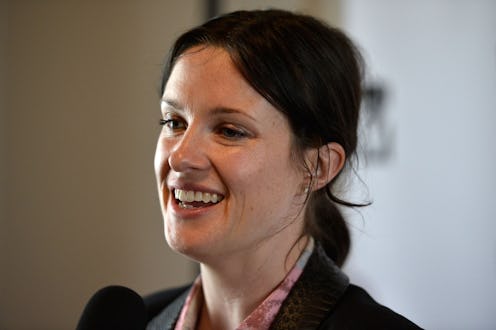Entertainment
The One Thing Hollywood Execs Need To Do To Hire More Women

When people ask why there aren't more women working behind the scenes in Hollywood, the responses they get tend to be more excuses than answers: "Not enough women apply for jobs." "The man we went with just seemed like a better fit." "Women just can't handle that type of work." By now, most of us are so used to the reality of the male-dominated film and TV industry that upon hearing these "reasons," we just roll our eyes and sigh — but not Liz W. Garcia, writer/director of the new film One Percent More Humid.
"I think that people in the business need to be more comfortable calling each other out, saying, 'That's a lame excuse for why this woman can't direct this film.' or 'Have you ever actually watched her work?' or 'Why aren't you more familiar with female directors?'" Garcia says, speaking via phone in April. "Because too often, executives and people that are in positions of hiring are making lame excuses that just disguise the sexism."
"Everyone is so afraid of losing their jobs, falling into a bad favor with someone," Garcia continues. "So I think essentially what Hollywood needs is more courage about holding each other to higher standards."
Garcia is no newcomer to the industry; having started her career as a writer for Dawson's Creek in the '90s, she's written for several TV shows, and directed two films — 2013's Kristen Bell-starring The Lifeguard, and this year's coming-of-age drama One Percent More Humid, which premiered at the Tribeca Film Festival. Over the course of her time in Hollywood, Garcia's own success has grown, but she's also experienced her fair share of sexism.
"I am perpetually frustrated by what it is to be a woman in Hollywood," she tells me. "But what I've made an effort to do is tell the difference between the stories that I want to be able to tell, and the stories that women broadly should be allowed to tell. In other words, women directors should have access to all genres and all scales of films. They shouldn't be pigeonholed... I wish [the pigeonholing] didn't exist, but my effort is to make the movies that I want to make that I'm interested in and make sure that female content is taken seriously."
Recently, Garcia says, she's witnessed some positive changes in the behind-the-scenes landscape for women. "I've seen now that executive agents are there and they're making more of an effort to talk about opening up the lists, making sure that women are on the lists, that women are getting interviewed," she says. And the effects of this are tangible, she adds; when more women are working as writers, directors, producers and more, the work that gets made is more realistic and equal. "More and more, outlets opened have up so that you actually have more content being created and available, and that means more people are being invited to the table to tell their stories," she explains. "And by virtue of that, you have a little bit more diversity in stories."
For instance, she adds, "you get to see things like Jessica Jones" — "an incredibly complex, expressive, lovable woman who is not just a male character played by a woman, which is something I've seen for a while." And you also get to see movies like Humid, a poignant, honest story about two college-aged friends (Juno Temple and Julia Garner) dealing with grief over a tragedy. Garcia wrote the script back in 2001, when she was "fresh out of college" herself, and she based Iris and Katherine's complicated friendship off her own dynamics with female friends she was experiencing at that time.
"It's not hard to depict the complexities of a female friendship if you are writing from an authentic place," she says now. 'That's all I was ever trying to do — to write something that felt compelling to me, not just nice, or make it palatable or acceptable."
Garcia's next project doesn't stray far from her roots; she's in the midst of writing the script for the third Sisterhood of the Traveling Pants movie, based on the 2011 book Sisterhood Everlasting. Although details are being kept quiet for now, Garcia says making the film has been "the best" — if a bit overwhelming at times.
"The pressure that I feel is to do the actresses justice because they've been living with these characters for so long and they are smart women with good taste," she explains, adding that the female stars are producers of the film, too. "I want them to be happy with what I do."
With someone as passionate about making Hollywood a fair and worthy place for women as Garcia writing the script, I think the Sisterhood stars can rest easy knowing they're in good hands.